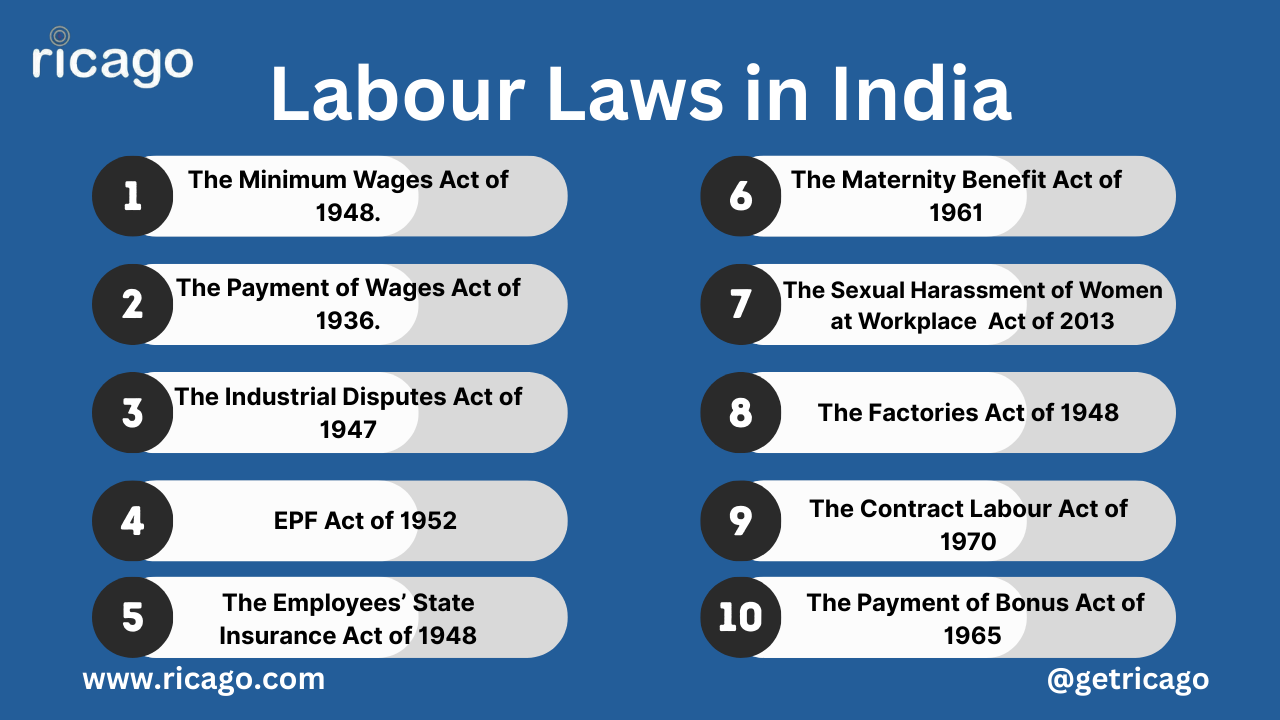In today’s ever changing business environment, understanding and complying with the appropriate labour law framework is not just a legal requirement, it is essential for building a sustainable and ethical business. Whether you have a new startup or a well-established business, it is essential to keep up with changing labour laws in India.
This comprehensive guide will outline the ten most essential labour laws that every employer should be aware of, emphasizing the significance of labour law compliance and the role of a reliable labour law consultant.
1. The Minimum Wages Act of 1948.
This law ensures that workers receive a minimum wage set by the government, either central or state, based on the type of work and location.
Why it matters: Employers must adhere to the Minimum Wages Act, which is essential for labour law compliance; employees can challenge any wages that fall below the legal minimum.
2. The Payment of Wages Act of 1936.
This requires wages to be paid on time, typically before the 7th or 10th of each month, and permits only reasonable deductions.
Why it matters: Delays or unfair deductions may lead to penalties and damage trust. Timely payments are a crucial expectation under Labour laws in India.
3. The Industrial Disputes Act of 1947
This law focuses on resolving conflicts between employers and employees, specifically related to retrenchment, layoffs, strikes, and similar issues.
Why it matters: By adhering to legal procedures during layoffs and terminations, companies can prevent Labour unrest and legal repercussions, which is essential for effective Labour law compliance.
4. The Employees’ Provident Funds and Miscellaneous Provisions Act of 1952
Employers must contribute 12% of employee wages to the Employee Provident Fund (EPF) for retirement savings.
Why it matters: This law secures employees’ post-retirement life, making it a highly valued Labour law in India.
5. The Employees’ State Insurance Act of 1948
This act provides medical care and income protection for illness, maternity, or disability.
Why it matters: ESI registration is mandatory for companies with over 10 employees earning below a specific salary threshold. Failing to register for ESI may result in substantial fines.
6. The Maternity Benefit Act of 1961
Women are entitled to 26 weeks of paid maternity leave and additional benefits, such as nursing breaks.
7. The Sexual Harassment of Women at Workplace (Prevention, Prohibition, and Redressal) Act of 2013.
This act mandates that all organizations with 10 or more employees establish an Internal Complaints Committee (ICC).
Why it matterst: Failing to establish an ICC can result in legal action. Many employers depend on a Labour law consultant to effectively implement this policy.
8. The Factories Act of 1948
Applies to manufacturing units and requires safety measures, proper ventilation, sanitation, working hours, and welfare amenities.
Why it matters: Regular inspections and employee complaints stem from non-compliance. Adhering to this act is essential for any industrial operation.
9. The Contract Labour (Regulation and Abolition) Act of 1970
Regulates the employment of contract workers, ensuring they receive fair wages, appropriate working hours, and necessary welfare facilities.
Why it matters: Contract workers are often exploited. Ensuring compliance can improve your company’s ethical standing and reduce legal risks.
10. The Payment of Bonus Act of 1965
Applies to companies with over 20 employees and mandates annual bonuses for employees earning less than ₹21,000 per month.
Why it matters: Failing to distribute bonuses according to the act can result in employee dissatisfaction and Labour disputes.
The Importance of Labour Law Compliance in India
In India, failure to comply with these labour laws can result in:
- Penalties may include fines or imprisonment.
- Labour strikes or legal disputes
- Impact on Employer Reputation
- Delays in operational processes and human resource policies.
Employers often collaborate with a Labour law consultant to:
- Stay updated on changes in regulations
- Handling audits or inspections
- Maintaining proper documentation and filings
- Train HR teams on compliance procedures
Conclusion:
Whether you’re an employee wanting to understand your rights or an employer looking to ensure smooth operations, grasping the Labour laws in India is essential, not optional. These laws are designed to create a fair balance between the rights of workers and the responsibilities of employers.
If you’re uncertain about your company’s compliance with Labour laws, now is the time to conduct an audit or consult a reliable Labour law expert to review your policies.



